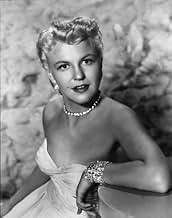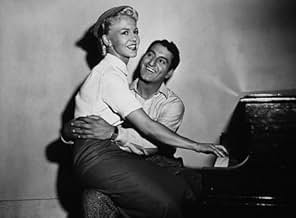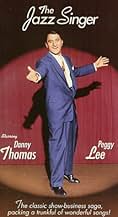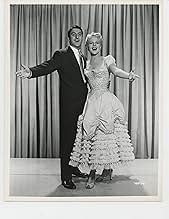Jerry dreams of becoming a famous jazz singer, but to accomplish that, he must defy his father, a Jewish Cantor who opposes such a dream as a future for a son of his.Jerry dreams of becoming a famous jazz singer, but to accomplish that, he must defy his father, a Jewish Cantor who opposes such a dream as a future for a son of his.Jerry dreams of becoming a famous jazz singer, but to accomplish that, he must defy his father, a Jewish Cantor who opposes such a dream as a future for a son of his.
- Nominated for 1 Oscar
- 1 nomination total
Murray Alper
- Taxi Driver
- (uncredited)
Jimmy Ames
- Music Store Proprietor
- (uncredited)
Featured reviews
102server
To be frank, this is probably the best version in my book as a sound movie version of the Jazz Singer. The 1927 version is really a silent movie despite its build-up as the first talkie.
Danny Thomas is a great comedian, and he sings very well. He does the Jewish stuff with feeling. Peggy Lee is great and any film that has her is always entertaining. Allan Joslyn is not too entertaining and we could have done without him. One question: since when do Cantors live in such luxurious houses???
Danny Thomas is a great comedian, and he sings very well. He does the Jewish stuff with feeling. Peggy Lee is great and any film that has her is always entertaining. Allan Joslyn is not too entertaining and we could have done without him. One question: since when do Cantors live in such luxurious houses???
10harveytk
I saw this film back when it opened in the very early 50's at , I think,The Brooklyn Museum with my aunt and cousin. I must have been 6-7 years old at the time, and to this day I have never forgotten the film. I particularly remember Danny Thomas singing wonderfully in the film and was very taken with not only his performance of Jerry Golding but also of Eduard Franz who played his father. Wonderful remake of Jolson's original version which opened almost 20 years before I was born. I have always been a huge Jolson fan since I was a small boy, and I wonder if this film did not reinforce that. Sorry it is rarely shown on any Cable network. I have the original soundtrack and listen to it all the time. Great songs, great story, great acting, great film! By the way, I did not like the 1980 version at all.
The story of a Korean war veteran returning home to start a new life as an entertainer instead of taking over the reins of succeeding his father as a Cantor was, I think, very relevant for that time and I think was depicted beautifully. Glad the plot had Mr. Franz recovering from his illness to enjoy his son's success at the end of the film. Nice touch!
The story of a Korean war veteran returning home to start a new life as an entertainer instead of taking over the reins of succeeding his father as a Cantor was, I think, very relevant for that time and I think was depicted beautifully. Glad the plot had Mr. Franz recovering from his illness to enjoy his son's success at the end of the film. Nice touch!
Rich looking redo of the legendary Jolson film that revolutionized the film industry ushering sound in and silence out.
The thing is that it was the technology that was the big deal about the film not the story which is pure hokum. However that seems to be something that the studio chose to ignore assuming the name recognition of the title would draw the crowds. The film did okay but it's a cornball exercise from start to finish. The main story was dated in '27 and is certainly no fresher in '52.
Danny Thomas just didn't have the strength of personality to make it on the big screen. Watching him it becomes apparent why he made it on TV and not cinema. He has a nice, likable demeanor, the sort that worked so well for Perry Como and Dinah Shore when they likewise abandoned the big screen for the small, but he doesn't dominate his scenes the way a leading man has to. He does sing well although not nearly well enough to be the rage of New York he's supposed to be.
That master of all genres Michael Curtiz moves the movie along well enough but it's too schmaltzy for him to be able to make it really memorable.
Putting all that aside the best reason to catch the film is the presence of Peggy Lee in the cast. This was her acting debut and while she doesn't have the instantly easy relaxed acting style of Doris Day the role doesn't put big demands on her, she did much better a few years on in Pete Kelly's Blues. It doesn't matter though when she sings which fortunately is often. When she does that all the hokeyness melts away and the viewer is treated to a legend doing what she does best, sing. An extra bonus is that she performs one of her biggest hits, Lover, in an elegant club setting giving you an idea of what it was actually like to see her in person.
Worth catching for Miss Lee but the story is sappy.
The thing is that it was the technology that was the big deal about the film not the story which is pure hokum. However that seems to be something that the studio chose to ignore assuming the name recognition of the title would draw the crowds. The film did okay but it's a cornball exercise from start to finish. The main story was dated in '27 and is certainly no fresher in '52.
Danny Thomas just didn't have the strength of personality to make it on the big screen. Watching him it becomes apparent why he made it on TV and not cinema. He has a nice, likable demeanor, the sort that worked so well for Perry Como and Dinah Shore when they likewise abandoned the big screen for the small, but he doesn't dominate his scenes the way a leading man has to. He does sing well although not nearly well enough to be the rage of New York he's supposed to be.
That master of all genres Michael Curtiz moves the movie along well enough but it's too schmaltzy for him to be able to make it really memorable.
Putting all that aside the best reason to catch the film is the presence of Peggy Lee in the cast. This was her acting debut and while she doesn't have the instantly easy relaxed acting style of Doris Day the role doesn't put big demands on her, she did much better a few years on in Pete Kelly's Blues. It doesn't matter though when she sings which fortunately is often. When she does that all the hokeyness melts away and the viewer is treated to a legend doing what she does best, sing. An extra bonus is that she performs one of her biggest hits, Lover, in an elegant club setting giving you an idea of what it was actually like to see her in person.
Worth catching for Miss Lee but the story is sappy.
Oy gevalt! What a disaster! Danny Thomas croons (badly), Danny Thomas tells jokes (badly) that are so corny and ancient Al Jolson would have been embarrassed to crack them, Danny Thomas emotes (badly, almost laughably). Opening scene had me wondering what all those goyim were doing in the temple! Peggy Lee was entertaining and a standout in this otherwise dreary film. The supporting cast were more-or-less adequate, with the mother and father characters well cast. Look for character actor William Schallert in a bit part, along with some other familiar faces. The Technicolor photography was superb. Watch all the scenes taking place in clubs across the nation and you'll notice that Danny and Peggy are using the exact same microphone in each one! My advice - stick with Jolie's groundbreaking original.
By 1952 Hollywood decided to remake the Al Jolson first-talking classic.
This time the Cantor's son was played by Danny Thomas. Coming home from the army, it is expected that he follow in the footsteps of his father and other male relatives by becoming a cantor. However, young Mr. Golding has quite a zest for show business.
At this time, he meets Peggy Lee, an aspiring singer. She acts very well and her rendition of her favorite song, Lover, is remarkable. The film writers were smart not to plug the obvious Jewish guy and non-Jewish girlfriend relationship. If anything, this is glossed over. In his anger, for betraying his pledge to become a cantor, his father makes the traditional Jewish sign indicative of a loss in the family. This would not be done under circumstances of breaking a pledge, it would be done if among the orthodox, an inter-faith marriage would take place.
Thomas does a really good job of playing the cantor's son. His singing is up to par as the film ends on a positive note.
Am surprised that technical advisers did not realize that women do not carry pocketbooks into synagogue on the sabbath or at all during that period.
This time the Cantor's son was played by Danny Thomas. Coming home from the army, it is expected that he follow in the footsteps of his father and other male relatives by becoming a cantor. However, young Mr. Golding has quite a zest for show business.
At this time, he meets Peggy Lee, an aspiring singer. She acts very well and her rendition of her favorite song, Lover, is remarkable. The film writers were smart not to plug the obvious Jewish guy and non-Jewish girlfriend relationship. If anything, this is glossed over. In his anger, for betraying his pledge to become a cantor, his father makes the traditional Jewish sign indicative of a loss in the family. This would not be done under circumstances of breaking a pledge, it would be done if among the orthodox, an inter-faith marriage would take place.
Thomas does a really good job of playing the cantor's son. His singing is up to par as the film ends on a positive note.
Am surprised that technical advisers did not realize that women do not carry pocketbooks into synagogue on the sabbath or at all during that period.
Did you know
- TriviaMichael Curtiz originally wanted Doris Day to play the role of Judy Lane.
- GoofsCatwalks, lights and other equipment rigged to the roof of the sound stage are clearly visible during a shot of an audience supposedly sitting in a real theater.
- ConnectionsReferenced in Make Room for Daddy: Linda, the Performer (1960)
- How long is The Jazz Singer?Powered by Alexa
Details
Box office
- Gross US & Canada
- $4,360,000
- Runtime
- 1h 47m(107 min)
- Aspect ratio
- 1.37 : 1
Contribute to this page
Suggest an edit or add missing content

























